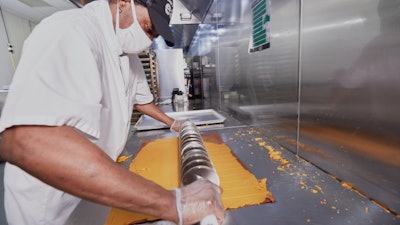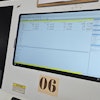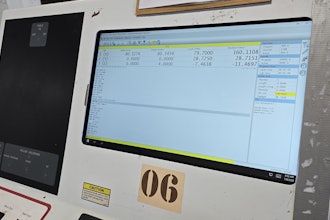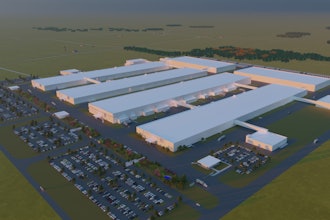
A small business on the road to success
Whole & Free Foods LLC-Every Body Eat is a Chicago-based manufacturer of allergy-friendly and gluten-free snacks. Every Body Eat first launched in early 2020 with its snack thins and has continued to grow its market by introducing crispbreads. Whole & Free Foods plans to continue its innovation with the launch of cookies and crackers in 2023.
Today, the business has seven administrative staff and 20 production members across two shifts making snack foods that are delicious and free of the top 14 allergens (wheat/gluten, milk/dairy, soy, peanuts, tree nuts, sesame, eggs, mustard, celery, lupins, sulfites, fish, shellfish, mollusks) and corn, which basically no other company can currently boast. With one third of U.S. households affected by allergies, this leaves Whole & Free Foods with a fair amount of wiggle room in their niche. Recently, a selection of their product line Every Body Eat became available in Whole Foods Market and Sprouts Farmers Market stores nationwide.
Using software to achieve traceability
The innovative spirit of the company also carries over to the way the business is managed. Like many startups, Whole & Free Foods initially used traditional spreadsheets to collect and compile business data, but officials quickly understood that Excel was not going to provide them with the traceability required in the food industry. That is why they opted for a modern MRP (Manufacturing Resource Planning) system that supported lot tracking.

Although traditionally business management software has been too expensive and complex for small manufacturers, modern cloud- and subscription-based solutions have turned the tide to the advantage of the little guys. From the dozens of available systems, Whole and Free Foods shortlisted three – Katana, Fishbowl and MRPeasy – with the latter finally coming out on top.
“MRPeasy was chosen on account of its price point as well as the general ease of use compared to other systems,” Fuoss said. “Of course, it fit all our other criteria as well – having a native integration with QuickBooks, for example.”
Employees are eager to ditch spreadsheets
According to Fuoss, the manufacturing resource planning system helps the company highlight waste on a week-by-week basis and allows it to address any red flags that come up before they become issues.
“We are still fine-tuning our production processes. We are measuring efficiency in yield per batch, as well as peak production volume,” he said, adding that the software has also helped with automating cumbersome data entry tasks.
Fuoss said the simplicity of the software coupled with its extensive library of online resources led to the decision to implement the system independently, a process that took around six weeks. Implementation started in sales and moved through the firm’s fulfillment, production and leadership teams, seeing high user adoption at WFF — as employees are keen on leaving spreadsheets behind.
“It’s key to get top-down team support and have the whole team involved in the system review process,” Fuoss said.






















